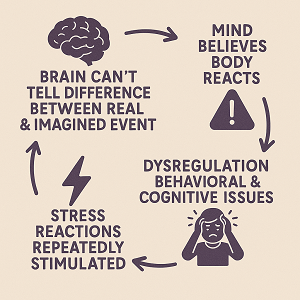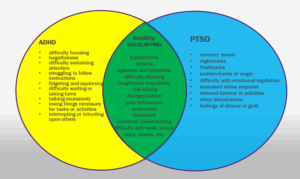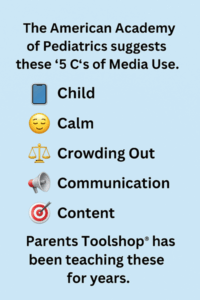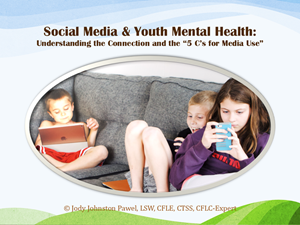A research study published 7/21/2025 surveyed over 1000 individuals who were 18 to 24 years old. They asked them, “When did you get a smartphone?” and about a whole host of mental health symptoms. (See news stories on Good Morning America, CNN, and CBS, Scripps News.)
The study found that children who start using smartphones before the age of 13 experience worse mental health outcomes, including increased suicidal thoughts, aggression, and detachment from reality. Specifically, 48% of girls and 28% of boys who got phones before 13 reported suicidal thoughts. Factors contributing to these issues include social media, poor sleep, deteriorating family relationships, and cyberbullying.
HOW CAN SOCIAL MEDIA CAUSE MENTAL HEALTH ISSUES?
For many years, Parents Toolshop® has been educating parents about the connection between technology, especially social media, and behavioral and mental health symptoms.
For example, the course, Social Media’s Effects on Parents and Children’s Mental Health, explains of the science of HOW screentime, especially social media, can impact the brain and body, specifically brain development, sleep cycles, digestion, and biochemical mood changes. Below is a summary of the key points with an infographic.

- The brain (the ACC or Anterior Cingulate of the Cortex, to be specific) can’t tell the difference between a real and imagined event.
- So, anytime the brain has a SIMULATED (imaginary) OR STIMULATED (real) STRESS REACTION, the MIND BELIEVES and the BODY REACTS as though it is in DANGER and MUST PROTECT ITSELF.
- This causes the brain and body to go into dysregulation, which shows up as behaviors that are deemed problematic, such as tantrums, inability to control one’s thoughts, words, and actions, anxiety, aggression (fight), withdrawal (flight), and cognitive or bodily functions can freeze up.
- When STRESS REACTIONS ARE REPEATEDLY STIMULATED, they start to rewire the nervous system and body, which can show up as problematic mental and physical health symptoms.
Of course, it matters WHAT children (and adults) are watching as well as WHEN and HOW LONG. The brain creates biochemicals of emotions based on what you think when you are watching, so watching happy puppies playing is likely to make you feel happy, calm, and relaxed, which produces biochemicals that are healing and healthy. If you watch them before bedtime, you still might have difficulty sleeping due to the screen light so close to bedtime.
The brain and body are designed to handle about 20 minutes of tolerable stress.
Any more than this and the biochemicals of stress can become toxic.
Examples include:
- Being around a negative person for long periods, like a boss, spouse, or parent.
- Being around an unpredictably aggressive or abusive person, you have to stay “on guard.”
- Repeatedly watching scary, stressful, or stimulating images for more than 20 minutes.
This applies to adults, too! Between 2021 and 2024, the U.S. Surgeon General published at least seven advisories or warnings about issues affecting families, particularly children and parents. He has said there is an “epidemic of loneliness and isolation,” contributing to “alarming increases in youth mental health challenges” and “dangerous” levels of parental stress. (See citations at the end.)
The same month, the CDC published an alarming study on teen screen time. Parents Toolshop® translates research into practice by offering articles and webinars that make complex concepts easy to understand and provide practical tools you can use every day.
For example, see these Parents Toolshop® courses:
- Social Media’s Effects on Parents and Children’s Mental Health (6/2023)
- Discussion: Surgeon General’s Warning about “Dangerous Levels of Parental Stress” (10/2024)
- Discuss the CDC’s Study on Teen Screen Time (10/2024)
WHAT IF YOU ARE ALREADY SEEING SIGNS OF SOCIAL MEDIA STRESS?
First, recognize the signs of stress in children, because they share symptoms with — and therefore often get misdiagnosed as — disorders such as Attention Deficit Hyperactivity Disorder (ADHD), anxiety, depression, mood disorders, dissociation, PTSD (Post-Traumatic Stress Disorder), and more!
- See the Parents Toolshop® course featuring David Zidar, LISW-S, on The Connection Between Trauma and Children’s Mental Health.

Next, break the cycle. Children need to break up their screen time with other healthy activities, such as:
- Playing outside to get fresh air and being physically active.
- Playing and or socializing with other children.
- Reading books or doing puzzles (not always on a screen)
- BTW, these are all great activities for adults, too, to maintain good brain and body health (“motion is lotion” for the joints).
- See more ideas in our article How to Get Kids to Turn Screens Off and Turn On to Life
TIPS FOR PARENTS AND FAMILY TIME AND RULES
Balance is the key — and Parent’s Toolshop® has been teaching a “Balanced parenting style” since it first coined the term in the first edition of The Parents Toolshop® book published in 1995.
As new research has come out over the past 30 years, it has validated what The Parent’s Toolshop® teaches. (We’ve only had to change one word and one sentence in the 456-page book!)
This shows us, as the article “The NeXt GenerationZ Parents” says,
“The world is different than when you were a child, but children haven’t really changed
and neither has what research shows is effective for parents to do
to raise healthy, resilient, self-sufficient, self-motivated adults.”
Parents Toolshop® has been supporting parents for decades, generation after generation, with timeless practical tools that work with all children, that you can apply to your situation and child. So as the world changes, you can consistently parent your child in effective ways.

In our training and resources, we always share helpful resources we’ve vetted for you in advance. On this topic, we recommend you check out the American Academy of Pediatrics recommended family media plan and the “5 C’s of Media Use.” Parents Toolshop® has been teaching these ideas for many years, so check out some of the recommended resources for each of their tips:
- Child: Understand your child’s interests and how screens and online content affect them, their moods, their sleep cycles. Identify what they like and why they engage with their screens, then brainstorm ways they can meet that purpose through healthier means.
- See the one-hour course, Social Media’s Effects on Parents and Children’s Mental Health.
- Calm: which Parents Toolshop® has been teaching for many years, just not in that “model.” Screen-based media often stimulates and simulates images and reactions that activate the stress response. Stress responses pause the growth and development process in children and can change their baseline level of “calm.” So children need to learn how to self-regulate their emotions and biological reactions to this stress.
- Parents Toolshop® offers a constantly-updated list of resources to help you learn more about stress, trauma, and how to teach children these skills. The first two sections list dozens of resources adults can use to teach children emotional self-regulation skills, so they can calm down when they experience symptoms of stress. The third section has links to resources to educate adults, both parents and professionals, about concepts such mentioned here and topics far deeper and more advanced than we can explore in this article, such as trauma.
- If a child’s brain and body have already become rewired to be stressed and/or you are already seeing these warning signs, then have children practice those self-regulation skills regularly, even when they aren’t stressed, so their body can experience calm on a repetitive basis. This breaks the cycle of stress and as the body has opportunities to relax it can start to heal. (There are more trauma-healing techniques in the resource list just mentioned.)
- Crowding Out (balancing activities): About 10 years ago, Parents Toolshop’s articles about family stress focused on issues like too many extracurricular activities! Today, especially post-pandemic, many parents wish their children would get out and do more! This is just one example of the challenges today’s parents face. There are so many online sources competing for your and your children’s attention that it can be easy to just sit around engaging in the constant stream of input. This isn’t healthy though. Setting limits on time and making sure every family member is getting up, moving, getting outside, and socializing with others are all important.
- Communication: Beyond setting rules, you want to be engaged with your children around their media use. You want to have open, frequent conversations, taking an interest in what they are learning and seeing.
- Get more practical suggestions in these Parents Toolshop® courses:
- “Parenting Digital Natives: Using Technology Safely, Amy Alamar, PhD, shares great tips on all these issues.
- Content: In addition to limiting the quantity of time your children are online, you also want to focus on the quality of what images and words are getting transmitted into their receptive brains. As their parent, you have the right to filter what they world is saying and help interpret it through your rules and values. So, the same course recommended above also offers ideas for establishing a family media plan that includes tips for how parents can help children avoid inappropriate material.
REFERENCES
(Listed in the order they appear in the article.)
- Dube, S., Ahmed, S., & Siddiqui, A. (2025). Smartphones not safe for preteens? A deep dive into mental health risks. Journal of Children and Media, 19(3), 215–229. https://doi.org/10.1080/19452829.2025.2518313
- ABC News. (2025, July 21). New report on mental health risks for kids with phones at young age [Video]. Good Morning America. https://abcnews.go.com/GMA/Family/video/new-report-mental-health-risks-kids-phones-age-123920766
- LaMotte, S. (2025, July 21). Smartphones not safe for preteens, new research suggests. CNN Health. https://www.cnn.com/2025/07/21/health/smartphones-not-safe-preteens-wellness
- Scripps News. (2025, July 21). Study warns about significant mental health risks of giving smartphones to pre-teens. https://www.scrippsnews.com/science-and-tech/study-warns-about-significant-mental-health-risks-of-giving-smartphones-to-pre-teens
- Murthy, V. (2021). Youth mental health: Current priorities of the U.S. Surgeon General. U.S. Department of Health and Human Services. https://www.hhs.gov/sites/default/files/surgeon-general-youth-mental-health-advisory.pdf
- Murthy, V. (2023a, May 3). New Surgeon General advisory raises alarm about the devastating impact of the epidemic of loneliness and isolation in the United States. U.S. Department of Health and Human Services. https://www.hhs.gov/sites/default/files/surgeon-general-social-connection-advisory.pdf
- Murthy, V. (2023b, May 23). Surgeon General issues new advisory about effects social media use has on youth mental health. U.S. Department of Health and Human Services. https://www.hhs.gov/about/news/2023/05/23/surgeon-general-issues-new-advisory-about-effects-social-media-use-has-youth-mental-health.html
- Advisory PDF: https://www.hhs.gov/sites/default/files/sg-youth-mental-health-social-media-advisory.pdf
- Murthy, V. (2024a, June 17). Why I’m calling for a warning label on social media platforms. The New York Times. https://www.nytimes.com/2024/06/17/opinion/social-media-health-warning.html
- Murthy, V. (2024b, August 7). Youth mental health—Current priorities of the U.S. Surgeon General. U.S. Department of Health and Human Services. https://www.hhs.gov/surgeongeneral/priorities/youth-mental-health/index.html
- Murthy, V. (2024c, August 14). Parental mental health & well-being. U.S. Public Health Service. https://www.hhs.gov/sites/default/files/parents-under-pressure.pdf
- Pawel, J. J. (2023, June). Social media’s effects on parents and children’s mental health. Relationship Toolshop® . https://relationshiptoolshop.podia.com/sm-mh-jjp
- Pawel, J. J. (2024, October). Discussion: Surgeon General’s warning about “dangerous levels of parental stress.” Relationship Toolshop® . https://relationshiptoolshop.podia.com/discussion-surgeon-general-warning-parental-stress
- Pawel, J. J. (2024, October). Discuss the CDC’s study on teen screen time. Relationship Toolshop® . https://relationshiptoolshop.podia.com/ptt-cdc-jjp
- Zidar, D. (2024, July). The connection between trauma and children’s mental health [Webinar]. Relationship Toolshop® . https://relationshiptoolshop.podia.com/faptt-zidar-trauma-mh
- Pawel, J. J. (2023, April 20). How to get kids to turn screens off and turn on to life. Parents Toolshop® . https://parentstoolshop.com/how-to-get-kids-to-turn-screens-off/
- Pawel, J. J. (2023). The Parents Toolshop® : The Universal Blueprint® for building a healthy family (25th anniversary ed.). Relationship Toolshop® , Ambris Publishing. https://www.amazon.com/Parents-Toolshop-Universal-Blueprint-Building/dp/1929643349
- Pawel, J. J. (2023, December 27). The NeXt GenerationZ Parents. Parents Toolshop® . https://parentstoolshop.com/next-genz-parents/
- American Academy of Pediatrics. (n.d.). 5 C’s of media use. Center of Excellence on Social Media and Youth Mental Health. https://www.aap.org/en/patient-care/media-and-children/center-of-excellence-on-social-media-and-youth-mental-health/5cs-of-media-use/
- Pawel, J. J. (n.d.). FREE resources for teaching/learning mindfulness & anger/stress management skills [Google doc]. Parents Toolshop® . https://parentstoolshop.com/keep-kids-cool
- Pawel, J. J. (2024, January). Teaching children anger & stress management [Online course]. Relationship Toolshop® . https://relationshiptoolshop.podia.com/keep-kids-cool-replay
- Pawel, J. J. (2023, June 18). How Can My Children Do Extra-Curricular Activities Without Creating More Family Stress?. Parents Toolshop® . https://parentstoolshop.com/family-stress/
- Pawel, J. J. (2023, February). Heartful communication: Making your point without pointing a finger or laying on guilt [Webinar]. Relationship Toolshop® . https://relationshiptoolshop.podia.com/ptt-communication-pawel
- Alamar, A. (2021, February). Parenting digital natives: Using technology safely [Webinar]. Relationship Toolshop® . https://relationshiptoolshop.podia.com/ptt-screentime-alamar
FOR MORE INFORMATION:
Jody Johnston Pawel is a Licensed Social Worker, Certified Family Life Educator (and recipient of the 2024-25 “Outstanding FLE” international award), Certified Trauma Support Specialist, and one of the first to qualify as a Certified Family Life Coach at the Expert Level. She is the author of the award-winning book, The Parent’s Toolshop® and a top-rated speaker who has trained over 100,000 parents and professionals and has certified over 100 Parent’s Toolshop® trainers and coaches worldwide. She has 30 years of media experience, with over 300 appearances and serving as the Assistant Producer and On-air Parenting Expert of the Emmy-nominated Ident-a-Kid television series. She has created 100+ multimedia resources that support and educate parents from diverse backgrounds and needs, and other adults who live or work with children. You can find them at the award-winning website, www.ParentsToolshop.com.
Reprint Guidelines: You may publish/reprint any article from our site for non-commercial purposes in your ezine, website, blog, forum, RSS feed or print publication, as long as it is the entire un-edited article and title and includes the article’s source credit, including the author’s bio and active links as they appear with the article. We also appreciate a quick note/e-mail telling us where you are reprinting the article. To request permission from the author to publish this article in print or for commercial purposes, please complete and send us a Permission to Reprint Form.

